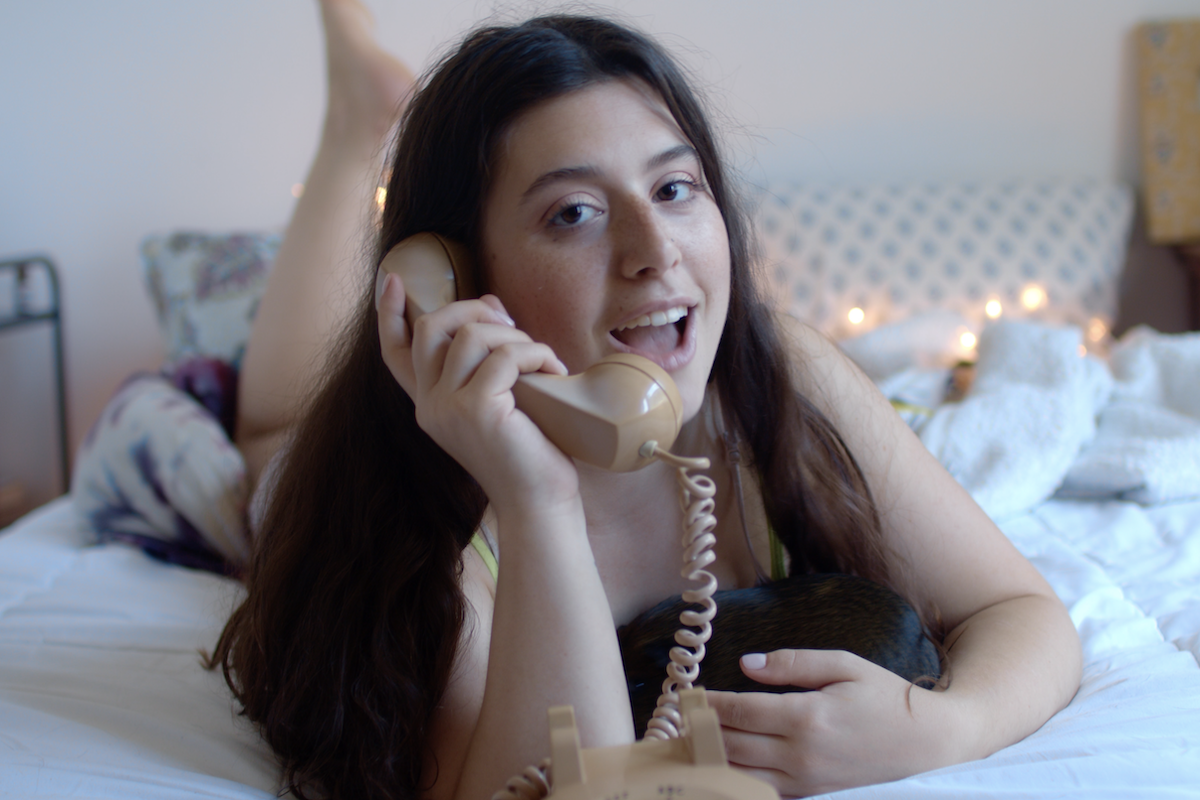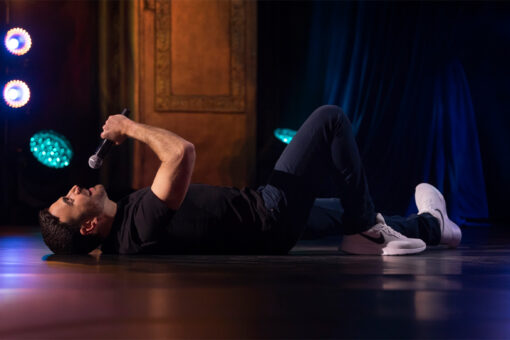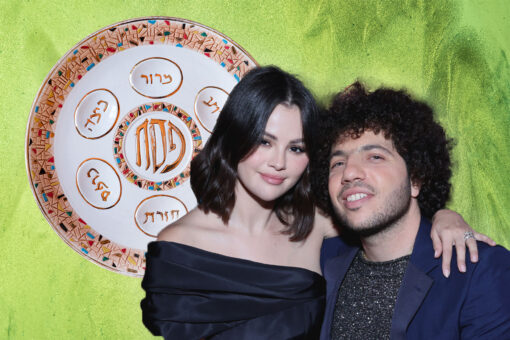Her new ukelele in hand, a young freckle-faced Emma Jayne took the stage at Camp Chi to perform her very first song in front of the entire Jewish sleepaway camp. The instrument was an 8th grade graduation gift from her mom, but despite mastering the ukelele, the soon-to-be high schooler had been bullied for her talents.
“There were some spoiled camp boys that would call me ‘ukelele girl’ and tease me, but you know what?” Jayne tells me over the phone. “For every spoiled camp boy there’s a nice Jewish boy, or a nice Jewish girl, to support your work.”
She was right.
Entranced by her performance, a camp counselor convinced Jayne to record her song “Promise Me” on his Garage Band software. “He was like, ‘Let’s record this thing, let’s do it!’” the now 23-year-old recalls. “It was a big setting-off point for me; it was the most amazing encouragement.”
And thus began Emma Jayne’s music career. Fast forward an album (“Jetlag”) and a handful of singles later, Jayne is slowly but surely climbing the ranks to join fellow queer Jewish pop singers King Princess (watch her cover of “Ain’t Together”) and BAUM in the spotlight. But where BAUM’s aesthetic is dark pop and King Princess’ is dreamy, Jayne has carved a space of her own as a folksy, soul pop singer.
The New York-based Chicago native recently celebrated hitting 100,000 streams on her single “Morning,” an absolute bop about hookups, and debuted a music video for “Selfish,” her latest single.
I chatted with Jayne about her new song, the importance of being a queer singer, and absolutely nailing her bat mitzvah Torah portion.
Your Instagram bio says that you “did a really good job at my bat mitzvah.” What was your theme?
The theme was karaoke because it was a karaoke bat mitzvah. It was at this bar in Chicago called Holiday Club and we did the slow dance and the hugging game but the real shining star was doing karaoke. When I say I did a really good job, I meant the Torah portion. I went and voluntarily read Torah again which is so psycho because I was just like this is fun, let’s do it again!
Do you regularly read Torah?
Oh my God, no, no. It was like a two and done. My friend Jack was getting bar mitzvahed and I was like I’ll just read the parsha at his. It’s torture for most people but I did it and I lived to tell the tale.
What does your Jewish identity mean to you?
I think community is the biggest aspect for me — that’s what draws me to Judaism. I don’t go to temple, I don’t keep Shabbat, and I don’t follow a lot of the rules, but I have a community. It’s always been so important to me, whether it’s camp or some of the Jewish people I met [in New York]. I love the automatic talking points and camaraderie feel that you have with a Jewish person, even if you just met.
I want to talk about your song “Morning,” which just hit 100,000 streams. Mazel tov! It sounds like it was written about getting over a fuckboy or a fuckgirl. Is that true?
I love the term fuckgirl. It’s so funny, you never hear it because girls are usually pretty nice.
So I graduated a semester early and went on tour and was going to a different place every weekend pretty much. I’d hook up with someone — you know, after the show you go out for drinks and you meet people, and you hook up. And I was just so bummed out by the one and done nature of it all. Until now, I haven’t really had anything long-term or serious.
So “Morning” is just about finding someone to stick around the next day and someone being there. I was trying to find people to be in the music video and I was going to have this one girl play a “nice girl.” I wanted her to be the one that stays and is nice at the end. But if you watch the music video there isn’t really someone that stays and is nice at the end. I asked her to do it and then we ended up hooking up and she disappeared the next morning. I was in the house alone and I was like, okay, it’s very ironic that I was going to cast you as the one who stays.
It makes me laugh now, and I kind of laughed in the moment, too. Humor is a coping mechanism, and it’s a good thing as long as you’re fully processing as well. I think “Morning” resonated with a lot of people because I feel like there’s a lot of pressure to hook up and be sexually liberated. But I think you can be sexually liberated and at the same time enjoy commitment, consistency, and communication.
Do you think being on tour makes it more difficult to connect with people?
I have a girlfriend now which is great; I don’t think it has anything to do with me touring around a lot. I was just at a point in my life where I was tired of the way things were and the constant, you know, seeing someone and being their flavor of the week and then them forgetting about you.
My favorite song of yours is “Tandem Bike.” In the first verse the lyrics read: “All these pages that I fill with words of negativity/ they don’t help me they contribute to the crash.” Can you elaborate on that?
I was writing a bunch of sad songs at the time at some point in sophomore or junior year. I was writing a bunch of sad songs in my angsty teen years and had a lot of unaddressed anxiety. I wrote “Tandem Bike” to try to make myself feel better, kind of a fake it ‘till you make it. Like, I’m okay. I’m great.
Did it work?
Yeah, but it’s always going to take 12 different little things to make you feel better. It’s not just the song that helped me, but I always feel better after writing. It’s very therapeutic for me. But I think it was a combination of the song, self-realization, and taking a step outside myself for a second.
I started going to therapy. I started taking medication for depression and anxiety. The sad can go away and sometimes the depression can, too, but it’s literally a chemical imbalance. It’s something you have to handle and deal with for the rest of your life. You still experience the highs and the lows, it’s just that I’m getting better at dealing with them. But I was at a point in college when I was so ridden with depression and anxiety that I really didn’t want to write anymore, and the songs I did write sucked, and I thought nobody would listen to them. It’s really scary when the things that interest you don’t really interest you anymore when you’re in a low place. But I always tell myself, even when I’m at my lowest, I can go back to music.
Let’s talk about “Selfish.” Who is it about?
It’s about fuckgirls, honestly. I’ve always been very scared of confrontation and scared of conflict or offending anyone. I’m scared of people being mad at me and not liking me. So sometimes I’ll just keep quiet when something’s bothering me, and this song is just trying to be like, fuck that. I want to be a bitch! Like, you upset me and I’m going to make that known. I want to be the bad guy for a while instead of taking the high road.
Is expressing your feelings really being a bitch, though? Or just being honest with yourself?
I guess that’s my internalized whatever, thinking of standing up for yourself. Like, oh, she’s being bitch, look at her, you know what I mean? But no, some of the lyrics in the song are about really fucking someone up, like smashing their television. I want to do all this stuff and I want my feelings to be known, and I want to be honest for once. So, yeah, I don’t think it’s inherently bitchy, but some of the lyrics and parts of the song are bitchy just to prove a point.
In the music video you actually smash a T.V. Was that real???
I found it on the street, so if someone left their T.V. out for some fresh air, I’m sorry I took it and broke it.
At the end of the video you stick your hands into a cake and eat it. Is that symbolic of expressing your feelings and having your cake and eating it too?
Oh my god, I love that. Let’s just say that that’s what I meant. But no, I just wanted to stick my hand in the cake.
We talked about mental health and Judaism, but you’re also a queer singer, and I think that speaks to a lot of people who don’t really see that representation. How do you incorporate that into your music?
“Selfish” is about girls, which I didn’t make explicit, but that’s kind of cool because whether you’re queer or not, people still get hurt and fall in love. I put out “Three Years Later” this year and there’s a recorded version and a live version. In the recorded version I wasn’t out yet, and I was still really scared and doubting that I was even gay. I was on tour in LA recording the song and talking to my friend Jordy, and I remember saying oh, I’m not gay, I can’t be! I just think girls are pretty and I like them and I want to marry them. But no, I’m not gay. I was so in denial. When I got to New York I performed at a comedy show and sang “Three Years Later” and I changed the last line from “I think that I’ll take him home” to “I think that I’ll take her home.”
I was like, this feels so good to sing that. I started doing it on shows and people started to notice and reach out to me about how nice it is to hear the she pronoun in the song. Even though you can write a love song and not really gender it, it feels important for people to hear gender. It’s important to put in music, and it’s important for me because it helps me be public about being gay, and it’s important for people listening who want that representation.
Image courtesy of Emma Jayne



